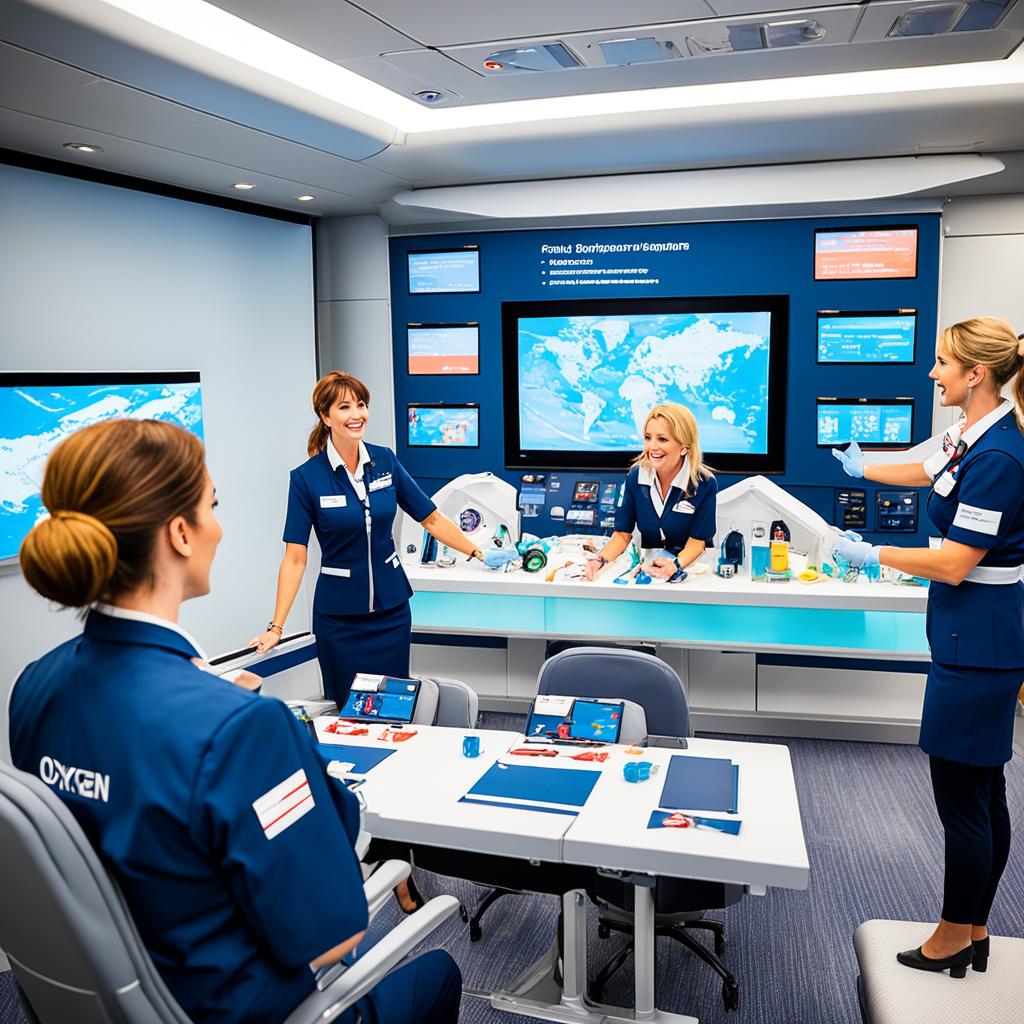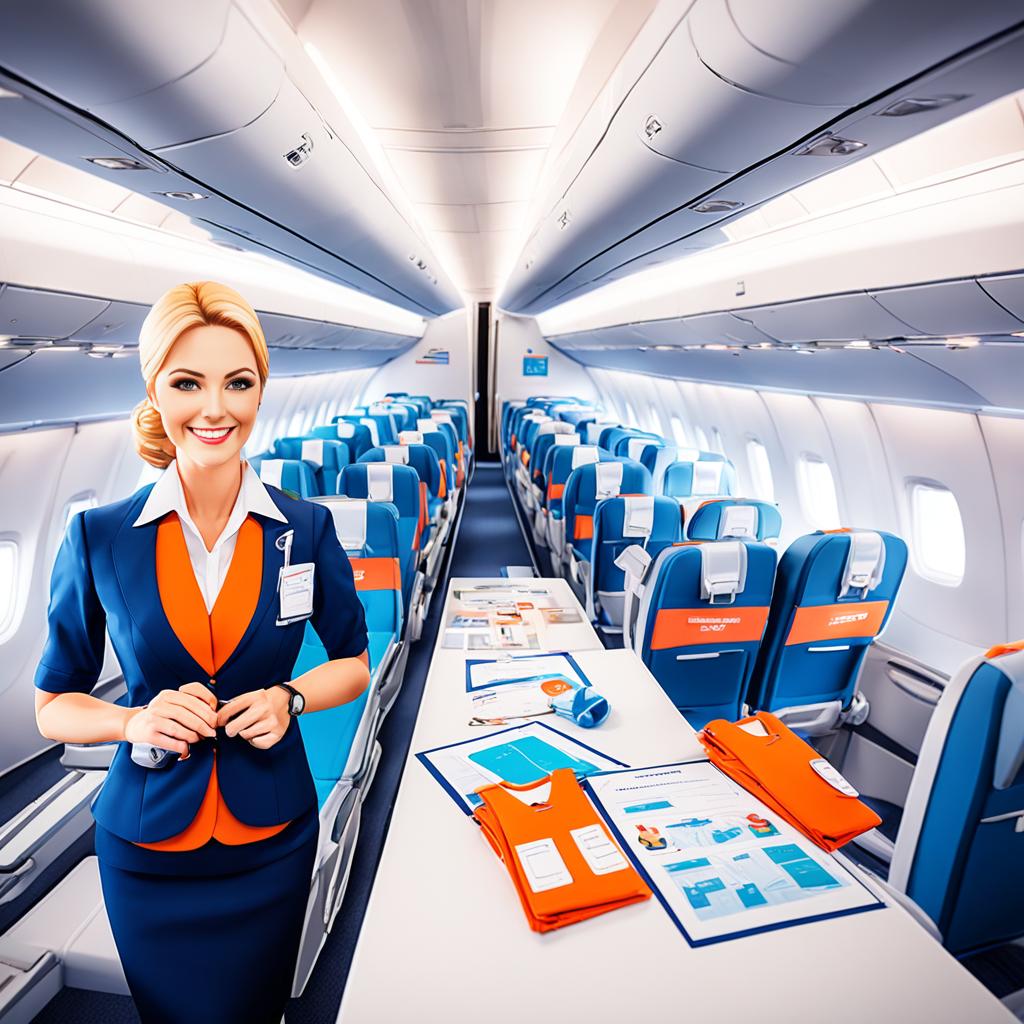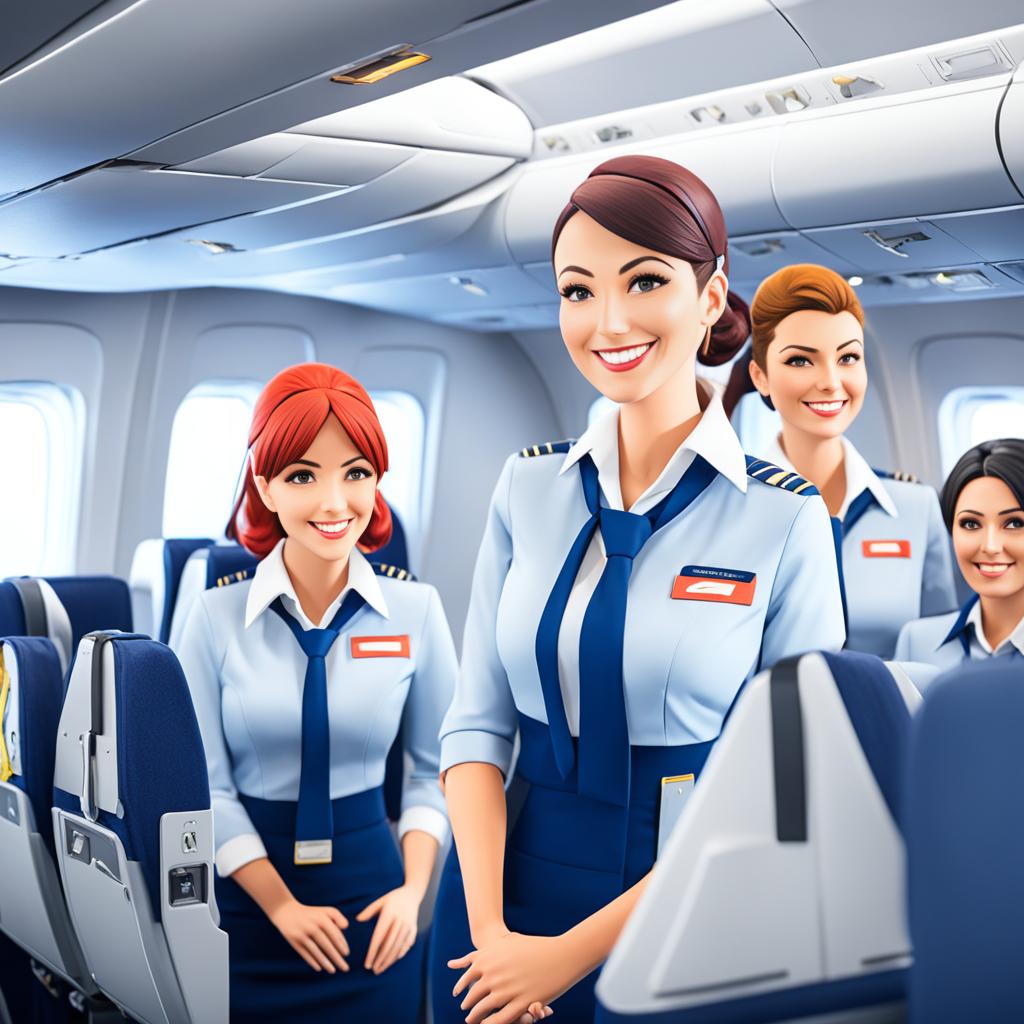Have you ever wondered if flight attendants receive paid training before taking to the skies? It turns out that most major airlines do provide paid training for new flight attendants, ensuring they are well-equipped for their important role in ensuring passenger safety and comfort.
Flight attendant training programs typically last 4 to 8 weeks and cover a range of essential skills. These programs are divided into modules that encompass safety procedures, customer service, and in-flight service, empowering trainees with the knowledge and expertise needed to excel in their profession.
During the training period, flight attendant trainees may need to cover certain costs themselves. But fear not! Airlines often bear the costs of tuition, travel, lodging, meals, incidentals, uniforms, and supplies to ensure trainees can focus on learning and preparing for their role in the skies.
But what about compensation? While the pay during the training period may be lower than a qualified flight attendant’s full salary, trainees usually receive a form of compensation. So, rest assured that you can pursue your dream of becoming a flight attendant without worrying about financial strain.
So, if you’ve ever dreamed of taking to the skies as a flight attendant, knowing that paid training is available can give you the confidence to pursue your career aspirations. Get ready to soar to new heights!
Length and Format of Training

When it comes to flight attendant training programs, the length of training can vary depending on the airline and program. On average, these programs typically last between 4 to 8 weeks.
The training is designed with a comprehensive curriculum that covers various aspects of the job. Trainees will be exposed to modules that include safety procedures, emergency protocols, customer service, and in-flight service. This ensures that they are equipped with the necessary skills and knowledge to provide excellent service to passengers.
The training is conducted in both theoretical and practical sessions, allowing trainees to learn and practice their skills. In practical sessions, trainees have the opportunity to simulate real-life scenarios in a cabin environment, which helps them gain hands-on experience.
| Training Program Components | Duration |
|---|---|
| Safety Procedures | 2 weeks |
| Emergency Protocols | 1 week |
| Customer Service | 1 week |
| In-Flight Service | 1 week |
The training programs are designed to ensure that trainees are prepared for the various aspects of their role as flight attendants. With a combination of theoretical knowledge and practical experience, trainees will be ready to embark on their career in the skies.
Locations of Training

Flight attendant training is typically conducted at airline training centers or dedicated facilities equipped with mock-up aircraft cabins and training devices. These specialized training centers are strategically located near major airports or airline hubs for convenience and accessibility.
By choosing locations near these transportation hubs, airlines ensure that trainees have easy access to the training facilities. It also allows for efficient coordination with the airline’s operations and resources, providing a comprehensive learning experience.
Some airlines go the extra mile to support their trainees by providing accommodation during the training period. This eliminates the need for trainees to commute or find temporary housing, allowing them to fully focus on their training.
Attending training at airline training centers offers several benefits. Trainees gain hands-on experience in a realistic cabin environment, allowing them to practice their skills and apply the knowledge they have acquired. The use of mock-up aircraft cabins and training devices simulates real-world scenarios, ensuring that trainees are well-prepared to handle various situations on board.
Overall, the locations of flight attendant training centers play a crucial role in providing a comprehensive and effective training experience for aspiring flight attendants.
| Airline | Training Center Locations |
|---|---|
| United Airlines | Chicago, IL; Denver, CO; Houston, TX; Los Angeles, CA; Newark, NJ; San Francisco, CA; Washington, D.C. |
| American Airlines | Dallas/Fort Worth, TX; Charlotte, NC; Miami, FL; Chicago, IL; Phoenix, AZ; Philadelphia, PA; Los Angeles, CA |
| Delta Air Lines | Atlanta, GA; Minneapolis, MN; Salt Lake City, UT; Los Angeles, CA; Detroit, MI; New York City, NY; Seattle, WA |
Costs of Training Borne by the Airline
When it comes to flight attendant training, the good news is that airlines typically cover the costs. This means you won’t have to worry about paying for tuition and fees out of pocket. Airlines understand the importance of investing in their employees and want to ensure that their flight attendants receive the necessary training for success.
In addition to covering the training costs, airlines often provide travel and lodging for trainees during the training period. This is especially beneficial for those who may need to travel to a different location for training. By taking care of these logistics, airlines make the training experience more convenient and accessible for aspiring flight attendants.
Furthermore, airlines also understand the importance of taking care of their trainees’ well-being. To ensure that trainees are able to focus on their training without any distractions, airlines typically provide meals and incidentals. This means you won’t have to worry about paying for food or other incidental expenses while attending training.
Another cost borne by the airline is the provision of uniforms and necessary supplies for the trainees. Airlines want their flight attendants to represent their brand in a professional and uniform manner. Therefore, they take responsibility for providing the required uniforms and any other supplies necessary for the training.
Overall, airlines take the financial burden off aspiring flight attendants by covering the costs of training. From tuition and fees to travel and lodging, as well as meals, incidentals, uniforms, and supplies, the airline ensures that trainees can focus on their training without worrying about the associated costs.
Pay During Training Period

When pursuing a career as a flight attendant, it’s important to consider the pay structure during the training period. While the specifics may vary among airlines, many companies do provide some form of compensation to trainees to support them during this learning phase. Typically, this compensation can come in the form of a stipend or a reduced salary.
However, it’s important to note that the pay during the training period is usually lower than the full salary of a qualified flight attendant. As trainees are still acquiring the necessary skills and knowledge, this lower pay reflects the ongoing learning and development process. While it may not match the income of experienced flight attendants, the compensation provided during training helps trainees cover their living expenses.
During the training period, flight attendants-to-be have the opportunity to gain valuable hands-on experience and learn essential skills for their future roles. Although the pay may be lower, the training period is a crucial investment in building a solid foundation for a successful career in the aviation industry.
However, the compensation structure may vary across airlines, so it’s essential to research and understand the specific pay arrangements offered by different companies. By considering the pay during the training period, future flight attendants can better plan their finances and make informed decisions about their career path.
Next, we’ll explore the various costs that trainees are responsible for during their flight attendant training.
Costs Paid by the Trainee
When considering a career as a flight attendant, it is important to be aware of the financial responsibilities associated with training. While airlines generally cover the costs of flight attendant training, there are certain expenses that trainees are typically responsible for.
These costs may include drug tests, background checks, medical exams, passports and visas, and transportation to the training location. Prior to beginning your training, you may be required to undergo a drug test and a background check, which are expenses that you would need to cover. Additionally, medical exams, passports, and visas are necessary for you to enter and work in different countries, and these costs generally fall on the trainee.
One aspect that trainees should keep in mind is the transportation to the training location. Depending on your situation and the training center’s location, you may need to arrange and pay for your own transportation. It is crucial that prospective flight attendants are prepared for these financial obligations and budget accordingly.
Despite the initial financial commitment, investing in flight attendant training can pave the way for a rewarding and fulfilling career. By being aware of the costs associated with training, you can better prepare for this exciting journey and embark on a path to success in the aviation industry.


